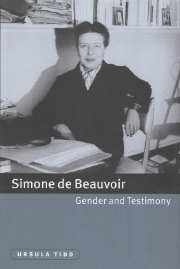Epilogue
Published online by Cambridge University Press: 22 September 2009
Summary
In this study, it has been argued that Simone de Beauvoir's testimonial autobiographical project developed from her Other-oriented philosophy of the 1940s, in which she argued that subjectivity must always be a subject-in-the-world and a subject-for-others.
Beauvoir said in the final volume of her memoirs that ‘écrire est demeuré la grande affaire de ma vie’. Her notion of literature, from the beginning of her writing career, was concerned with bearing witness to her own experience and engaging with alterity. Writing was an opportunity to create a ‘rapprochement’ between people, as she explained in 1966:
Je pense qu'une des tâches des écrivains, c'est de briser la séparation au point où nous sommes le plus séparés, au point où nous sommes le plus singuliers.
To some extent, it can be argued that this concern for others was rooted in the Christian values of her bourgeois background, against which she struggled for much of her life. More important, perhaps, is the fact that much of her life and her writing project was affected by war.
Her knowledge of the different ‘situations’ of other people's lives was also decisively influential in shaping her testimonial writing project. Moreover, her friendships with Nelson Algren, Richard Wright and Claude Lanzmann confirmed her belief in the importance of testimony.
- Type
- Chapter
- Information
- Simone de Beauvoir, Gender and Testimony , pp. 175 - 177Publisher: Cambridge University PressPrint publication year: 1999



